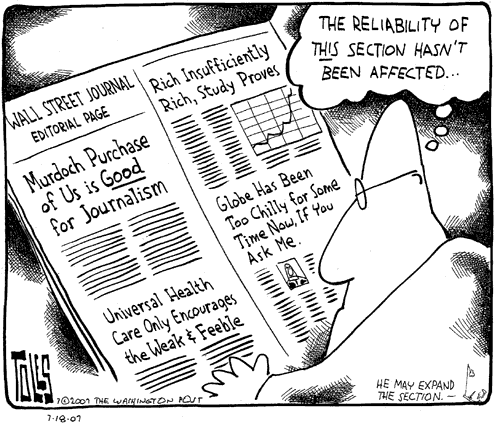http://online.wsj.com/article/SB100...79107460368019966.html?ru=yahoo?mod=yahoo_itp

That is not even a news article, it is something an insane teen would write so as to pseudo-justify his hatred against others. From the title of the article one already can tell just how intelligent it would be. Now the Usa (government) is in "Team Democracy", so it does not matter if no one else supports the new bombing and death campaign.
I don't care about the lame quality of the actual article, one sees this everywhere nowdays in western countries and it is nothing new. But it does surprise me a bit that known journals can afford to be so openly mere hatemongers and nothing else, since that seems to signify that they can get away with it.
Not a good sign of things yet to come.
(You can discuss if you liked this prestigious article by the wsj, posted at full length in the quote starting the OP).
wsj said:Syria, Russia 1; U.S., Democracy 0
You rightly conclude that the U.N. resolution on Syrian chemical weapons is regarded as a victory for Bashar al-Assad, but surely not just by the disheartened Syrian opposition but by the world at large ("Assad's U.N. Partners," Review & Outlook, Sept. 28). It is obvious that Vladimir Putin has successfully delivered a one-two punch.
He has contended that Syria's chemical weapons were merely a counter to Israel's stock of nuclear weapons, and no doubt for him Assad's undisclosed 18 chemical sites, hidden after President Obama's aborted "not a pinprick" threat, continue to be justified. And just as Mr. Putin hasn't been pushed by the West to reveal his evidence that the Aug. 21 massacre can be traced to the rebels, so the Security Council won't press him to disclose the missing sites. Mr. Putin's recent offer to send Russian soldiers to Syria to protect the inspectors sent to destroy the less than complete listed sites is meant to increase Russia's growing power in the Middle East. Further, it is clear that the Damascus massacre was intended to result in a U.N. compromise to raise Assad's stature by increasing the relative power of the extremists among the rebels, allowing Assad to frighten the West, which is fearful now that the jihadists might replace him.
A coming Geneva meeting? Forget it. The Chinese have an idiom for such a practice: "Kill the chickens to scare the monkeys."
Bertrand Horwitz
Asheville, N.C.

That is not even a news article, it is something an insane teen would write so as to pseudo-justify his hatred against others. From the title of the article one already can tell just how intelligent it would be. Now the Usa (government) is in "Team Democracy", so it does not matter if no one else supports the new bombing and death campaign.
I don't care about the lame quality of the actual article, one sees this everywhere nowdays in western countries and it is nothing new. But it does surprise me a bit that known journals can afford to be so openly mere hatemongers and nothing else, since that seems to signify that they can get away with it.
Not a good sign of things yet to come.
(You can discuss if you liked this prestigious article by the wsj, posted at full length in the quote starting the OP).




